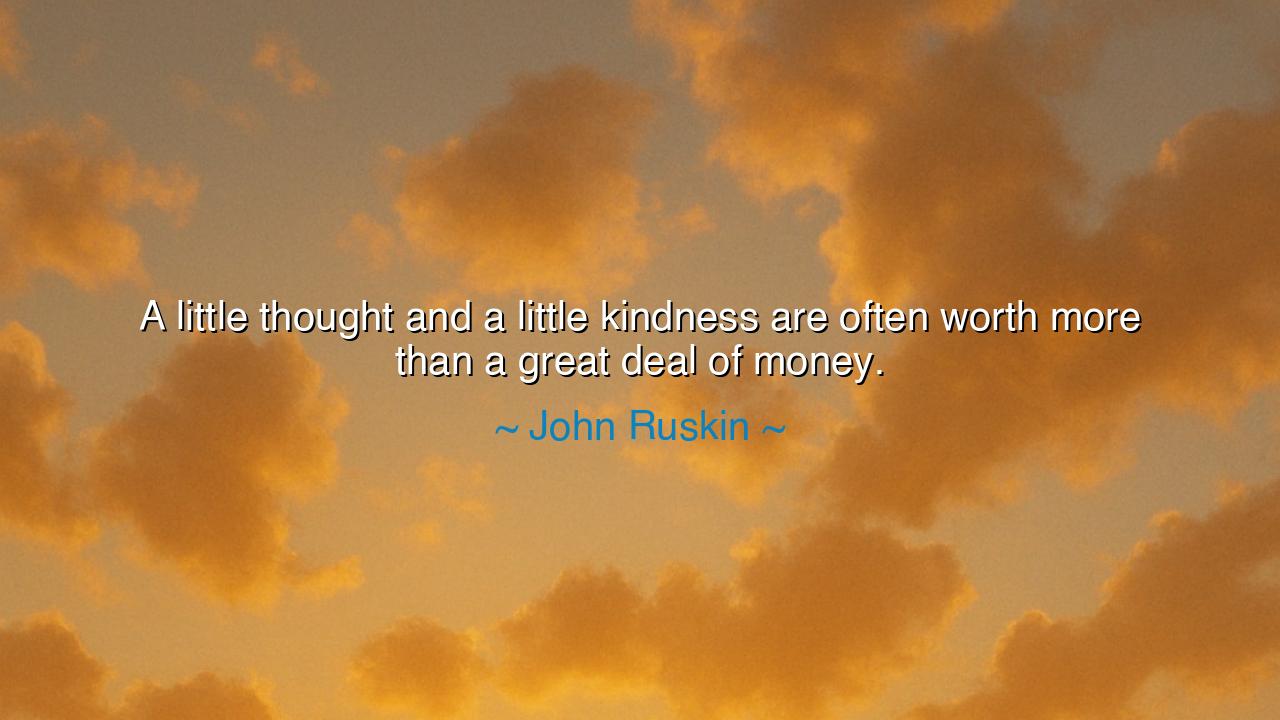
A little thought and a little kindness are often worth more than
A little thought and a little kindness are often worth more than a great deal of money.






“A little thought and a little kindness are often worth more than a great deal of money.” Thus spoke John Ruskin, the Victorian sage, artist, and moralist, whose pen sought not merely to adorn the mind, but to awaken the heart. In an age when the engines of industry thundered and men measured greatness by gold, Ruskin lifted his voice to remind the world that human worth is not weighed in coin, but in compassion. His words shine as a lamp for all generations, revealing that true richness lies not in the abundance of possessions, but in the abundance of thought and kindness.
To Ruskin, a little thought meant more than idle sympathy; it meant the attention of the heart — the sacred art of seeing others as living souls, not as tools or obstacles. “A little kindness” was not a grand gesture, but the gentle light of daily goodness — a smile, a listening ear, a helping hand. Such small acts, he taught, may seem like dust in the world’s vast machinery, but they are the dust of stars — they illuminate the dark corners of human life. Money can buy food for the body, but kindness nourishes the soul; money can build houses, but thought builds homes; money can purchase labor, but kindness wins loyalty and love.
Ruskin’s life was one of paradox — a man born into wealth, yet forever wrestling with the moral emptiness of material success. As he watched the factories of England rise in smoke, he saw the hands of laborers grow rough, their faces weary, their hearts unseen. His writings in Unto This Last and The Stones of Venice were a cry against this blindness. “We build palaces,” he said, “but we forget to build men.” His quote about thought and kindness was not mere sentiment, but a revolution in miniature — a call to awaken the conscience of a nation drunk on profit. He sought to restore humanity to an age that had begun to worship production more than purpose.
Consider the story of Florence Nightingale, his contemporary, who carried a lamp through the bloodied corridors of war. She had no fortune to give, no authority to command — only thought for the suffering and kindness in her hands. Yet her light changed the world, turning cruelty into care and neglect into compassion. The power of money could not have accomplished what her heart of service achieved. In her, Ruskin’s ideal took flesh: that the smallest act of mercy, guided by thought, is a treasure greater than any gold.
History bears countless such examples. The emperor Marcus Aurelius, though ruler of vast dominions, wrote not of conquest but of gentleness and duty. The monk Francis of Assisi renounced wealth to embrace the poor and found in their company a joy the rich could never know. Even in our own time, when nations chase prosperity like a mirage, those who are remembered with love are not the rich, but the kind — those who took a moment to think, to care, to uplift. For money fades, but goodness endures, echoing in hearts long after the giver is gone.
And yet, how rare it is to see such simplicity honored! Men strive to amass fortunes and forget that one thoughtful word may heal more wounds than a thousand coins. To think is to understand; to be kind is to act upon that understanding. The world’s hunger is not merely for bread, but for recognition — to be seen, valued, and loved. Thus, a little thought is the beginning of wisdom, and a little kindness is the beginning of peace. Together, they weave the invisible fabric that holds humanity together, stronger than any empire of wealth.
O children of tomorrow, take heed of Ruskin’s counsel. Do not despise small acts, for they are the seeds of greatness. Give when you can, but give also your attention, your respect, your gentle words. When you encounter the weary, think how you might ease their burden; when you see the forgotten, speak their name with kindness. Money may change hands, but kindness changes hearts, and that is the true currency of eternity.
So remember this truth as you walk the paths of life: a little thought and a little kindness are not small things — they are divine sparks, scattered into the world to light the darkness of indifference. You may not have riches, but you possess the power to heal. You may not change nations, but you can change one soul — and that, said Ruskin, is the beginning of all true greatness. Let your wealth, then, be measured not in gold, but in grace, and you will find that the poorest giver may, in the end, be the richest of all.






AAdministratorAdministrator
Welcome, honored guests. Please leave a comment, we will respond soon